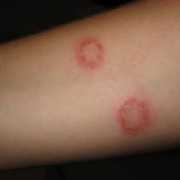Mold Forces Families Out
9/12/03
Wareham, MA – At least four tenants of the Depot Crossing low-income housing complex have left their apartments in the past year, complaining that mold from the basement was making them and their children sick.
The moves came even before one of the complex’s buildings was condemned this week.
Julie Florindo, who lived in Building E of the housing unit for four years until December, said she and her 12-year-old son, Matthew, have suffered from asthma and flu-like symptoms she believes are caused by mold. She said her hair is falling out, and blames her numerous other health problems on exposure to toxic mold.
“Matthew must not be exposed to mold,” wrote Dr. V. Blinn of Marion Pediatrics. “Please place him in an apartment that is mold-free.” Several allergy tests found Matthew and Julie Florindo to be allergic to mold. Ms. Florindo contacted health officials at the local and state level, has filed a complaint with the U.S. Department of Housing and Urban Development and spent hours researching the effects that mold can have.
She even bought herself a copy machine with money she earned returning 5-cent deposit cans, just to keep up with all the paperwork. “I have been through hell,” she said.
At first glance, a casual observer wouldn’t likely peg the apartments as a potential health hazard. But some residents would contend that appearances can be deceiving.
Jessica Johnson lived in Building E at Depot Crossing for eight months, and complained to the Board of Health that the mold was affecting the health of her infant son, Mark Johnson Jr.
She said her son became so ill as an infant that he contracted respiratory syncytial virus, which his doctor said might have been caused by mold exposure. In a letter from asthma specialist Dr. Catherine L. O’Brien to Mark’s pediatrician, Dr. O’Brien noted that a prick test on his arm was positive for an allergic reaction to mold and ragweed.
“I believe it is important for Mark’s mother to get the family relocated into an apartment that is not moldy, and she is working very hard on this at the moment,” Dr. O’Brien wrote.
Ms. Johnson said she broke her lease and left her apartment in Building E rather than continue to expose her son to the mold. Almost a year later, 2-year-old Mark is still using a breathing machine twice a day to give him the medication he needs.
“I kept asking (South Shore Housing, the building’s owner) to fix the problem, and they wouldn’t do it,” she said. “I finally gave up and left.”
A former tenant of Building F, Erin Elsayed (then Erin Court) said her then-3-year-old son had constant colds and breathing problems for the two years they lived in the building. He was hospitalized twice with pneumonia, and developed allergies. She said the mold and wetness was so bad in her apartment that her son could put his finger through the wall.
“They never wanted to fix anything, they never believed anything I said,” she said of South Shore Housing. Since she and her son moved out of the building eight months ago, he has not had any health problems. “When we were there, he had a cold all the time,” she said. “Now, he’s fine.”
Other tenants living in the second-floor apartments of Building E, however, did not report having any problems with mold.
The town’s health department has a thick file on Depot Crossing, and has urged the building’s owners to address the problems there. The building’s management has installed dehumidifiers and vents, sprayed mold killer on walls and floors and used other methods to try and rid the apartments of mold.
Roger Goguen, director of rental management for South Shore Housing, said the non-profit agency has been working with the town to address the complaints about mold. “We take our responsibilities very seriously. We’re not ignoring this,” he said. “Any complaints that we have received, we have responded to in an appropriate manner. You have tenant complaints as part of being a landlord. Any issues the Board of Health has cited, we have responded to and addressed to their satisfaction.”
The town’s director of inspections, Theodore Misiaszek, took the drastic step this week of condemning Building E at Depot Crossing. The reason was not mold, although inspectors found plenty of it. It was because chronic flooding had weakened the joists supporting the building, which could have led to its collapse. All four tenants were moved out temporarily into hotels, or are living with family.
There is little doubt the complex has a mold problem. Several inspections of Building E — one private, one paid for by South Shore Housing — have turned up extensive evidence of mold.
South Shore’s mold inspection, conducted by OccuHealth Inc. of Mansfield and submitted to the Board of Health, found very high concentrations of mold in the crawl space underneath the two apartments that Ms. Florindo and Ms. Johnson lived in.
The report notes that 2,000 counts of mold per cubic meter of air is considered “low” or “safe.” In the crawl space, mold was present at 533,786 parts per cubic meter. That mold found its way into Ms. Florindo’s bedroom (8,974 parts per cubic meter) and Matthew’s bedroom (5,704 parts per cubic meter).
Another mold inspection, paid for by Ms. Florindo, found even more types of mold, and in even higher concentrations.
“I can’t even go back in there without getting a fever,” Ms. Florindo said this week. “I think all of my clothes are contaminated, too. It’s been horrible.”


 foreheadcare.com
foreheadcare.com 



